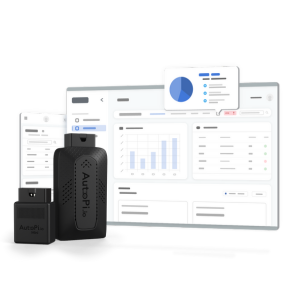Creating the perfect logo design is a critical task, for the reason that an automaker's logo may, and arguably should, be as well-known as its vehicles.
Tesla's logo is far from anonymous, but it turns out there's more to it than meets the eye. So what does Tesla mean? Let's dive into that.

The True Meaning of the Tesla Logo
In short, the meaning behind the Tesla logo is a cross-section of an electric motor.
The Tesla logo is a distinctive, futuristic-looking rendition of the letter "T." It has a white logo on a black or red backdrop.
It was RO Studio that created the Tesla logo. The Tesla logo was originally designed to fit inside a shield, symbol, but the firm eventually dropped the shield and elected to go with the "T" as its mark.

What seems to be a stylized "T" is a reference to the company's products, according to Tesla CEO Elon Musk in a tweet. The Tesla logo is meant to resemble a cross-section of an electric motor.

The main body of the "T" represents one of the poles that protrude from the rotor of a motor, while the second line on top represents a piece of the stator. It creates a decent approximation of an electric-motor cross-section by repeating the Tesla logo in a circle, with the top of each "T" facing outward.
Tesla Models Timeline
Tesla Roadster (first generation), 2008
The Tesla Roadster, Tesla's first model, was manufactured from 2008 to 2012. The Roadster can accelerate from 0 to 100 km/h in under 4 seconds, travel about 392 kilometers on a single charge, and reach a peak speed of 200 km/h.
Tesla Model S, 2012
On June 22, 2012, the first Tesla Model S cars for US buyers were delivered at a special event at the Tesla facility in California. The car was given the codename "Whitestar" at first.
Model S is also one of the world's quickest automobiles, not only electric cars but all cars in general. It has a range of roughly 528 kilometers and can accelerate from 0 to 100 km/h in 4.4 seconds.
Tesla Model X, 2015
The Tesla Model X is a four-wheel drive SUV.
The initial prototype was revealed in February 2012, and the first copies were delivered to clients in California in September 2015.
The vehicle is based on the same platform as the Tesla Model S. The Model X is distinguished by its falcon doors, or "gull-wing doors," which allow drivers to stand up in the vehicle.
Tesla Model 3, 2017
Model 3 began manufacturing in 2017 and was available on the European market in 2019. Temperature, driving style, and charging pattern all have a significant impact on the quoted range.
The car's central operational display, which replaces traditional buttons and displays, is one of the numerous advances.
Tesla Semi,2017
Tesla Semi is a developed all-electric battery-powered Class 8 semi-truck. It was revealed In November 2017, with manufacturing set to begin in 2023.
Tesla Model Y,2019
The Tesla Model Y is a forthcoming electric vehicle crossover (CUV). It was unveiled in March 2019, with delivery to the US market scheduled for mid-March 2020, and the European and Asian markets scheduled for 2021.
Similar to Model 3, it is Tesla's second mass-market model, and it shares many components. As an option, the Model Y has a third row of seats that seats seven people.
Tesla Cybertruck, 2022
Cybertruck was introduced in 2019, as an all-electric, battery-powered, light-duty truck. Three versions have been unveiled, with EPA range estimates ranging from 400–800 kilometers (250–500 miles) and 0–100 km/h (0–62 mph) times ranging from 2.9 to 6.5 seconds, depending on the model. Production will commence in 2022.
Take a look at which Tesla models are compatible with an AutoPi device.

Briefly facts about Tesla
Now and again, a company emerges that is daring and imaginative enough to disrupt an entire industry. When Ford originally produced the Model T (one of the earliest automobiles), it irrevocably altered the transportation sector.
Tesla is now a firm that is seeking to transform the transportation sector in the same dramatic way by making electric, self-driving vehicles the go-to vehicle design of the future.
-
Tesla has had many moments of glory and failure in their very brief lifetime.
-
Tesla's global revenue is estimated to be around $31.5 billion (FY 2008 to FY 2020).
-
Tesla's quarterly car deliveries throughout the world are estimated to total 241k (1st quarter 2016 to 3rd quarter 2021).
-
Tesla's quarterly operating margin is estimated to be around 14.6 percent (1st quarter 2019 to 3rd quarter 2021).
-
In 2021, Tesla delivered 936,000 vehicles, which is an 87% increase that puts the company at the pinnacle of the global EV industry, resulting in a 14% market share.
Facts about Tesla in 2022 and 2023
-
In 2022, Tesla achieved remarkable milestones:
-
Tesla manufactured and shipped over 1.3 million EVs worldwide, highlighting a major advancement in its production.
-
By the close of 2022, Tesla approached a total of 4 million units sold, averaging more than 100,000 vehicles produced monthly.
-
In the US, Tesla dominated the EV market, boasting an 80% market share, and they managed 3,254 Supercharger stations across 40 nations.
-
For Q4 2022, Tesla reported a revenue of $17.71 billion.
-
-
Moving into 2023, Tesla's momentum persists:
-
Tesla aims to introduce more budget-friendly electric vehicles, broaden its global charging infrastructure, and push boundaries in battery tech and self-driving capabilities. The company's growth goal stands at 50% annually, targeting volume, revenue, and margin increases.
-
In Q3 2023, Tesla produced over 430,000 vehicles and delivered more than 435,000. A volume dip was noted due to scheduled factory upgrade downtimes, as mentioned in their latest earnings report.
-
By June 2023, Tesla stood as the world's top-valued car brand.
-
A Brief History of the Company Ranked 50th in the Fortune 500 (Updated)
In Q1 2022, despite COVID-19 challenges in China, Tesla delivered 310,048 vehicles and recorded record earnings, rising from 100th to 65th rank within a year, and recently climbed to rank 50th.
Founded in 2003 in honor of inventor Nikola Tesla, Elon Musk joined in 2004 with a vision of producing affordable, eco-friendly cars. In 2017, the company broadened its focus from just electric vehicles to diverse energy solutions.
By 2019, Tesla was the global leader in electric vehicle sales. Their product range includes electric cars, battery storage, and solar panels. They've won three Stevie Awards for their web design and automotive achievements.
As of 2023, Tesla remains a key innovator in the global car market. Key updates include:
-
Model 3: Production of an updated Model 3, with a cost-efficient interior, will start in China around Q3 2023. Enhancements in power and battery for four Model 3 variants were confirmed.
-
Software: Tesla released updates enhancing user experience, with notable improvements to their Full Self-Driving features.
-
Pricing: Aiming to deliver 1.8 million vehicles in 2023, Tesla cut Model 3 and Model Y US prices to boost sales amid economic shifts and growing competition.
-
Cybertruck: Giga Texas is set to roll out Cybertrucks, as evidenced by several units spotted ready for delivery.



